If you want to know about digital transformation, you’ve come to the right place.
Digital transformation is a major business change involving technology. This article will give you an overview of the topic, explaining the main trends and ideas that will help you out.
But as you might have noticed, this site is about relevant topics in digital transformation, digital adoption, and all the ways technology can make a difference to your business.
One article can’t tell you everything you need to know. As the authors of a key HBR article explain, “digital transformation is not a single thing, but a multi-faceted journey with differing goals depending on your industry and digital maturity.”
So if you read through this piece and still need the answers, make sure you read our other articles.
To give you a simple introduction to a big topic, this article will go through the following steps:
- A definition of digital transformation
- Explain why digital transformation is so important today.
- Building your roadmap and framework
- The major trends in digital transformation.
Altogether, this will give you the building blocks for your next digital transformation journey. If you keep an eye on the latest digital adoption trends, you’ll be on the road to success.
- What Is Digital Transformation? A practical definition
- The benefits of digital transformation
- 4 Key Areas Of Digital Transformation
- How to build your roadmap to digital transformation
- What Is A Digital Transformation Framework?
- The key roles in Digital Transformation Strategy
- The Digital Technologies Driving Digital Transformation
- How to measure Digital transformation ROI
- How the COVID-19 Pandemic Impacted Digital Transformation
- What Does Digital Transformation Look Like In 2024?
- The time is now to start your digital transformation journey
What Is Digital Transformation? A practical definition
Digital transformation is the process of using technology to change the way a business operates. We call it “transformation” because the outcomes can be dramatic: and most companies need to use some kind of digital transformation strategy to create the best results.
Digital technologies like software, hardware, and data analytics are built into a company’s business processes in a successful digital transformation. Those processes might just be adjustments, but successful digital transformations may lead to new business models.
Today, there are examples of digital transformation across all industries. To give some on-the-ground examples:
- A retail store may use digital transformation to create an online store, allowing customers to shop from anywhere and providing the business with valuable data about their shopping habits.
- A hospital may use digital transformation to implement electronic health records, enabling doctors and nurses to quickly access patient information and improve the quality of care.
- A factory could use digital technology to monitor and manage its vendors and clients. With root-and-branch changes to their systems, this would count as a digital transformation.
Overall, digital transformation aims to improve business efficiency and better meet the needs of its employees & customers. It is a key consideration for businesses in today’s digital age, as technology plays an increasingly important role in how we live, work, and do business.
The benefits of digital transformation
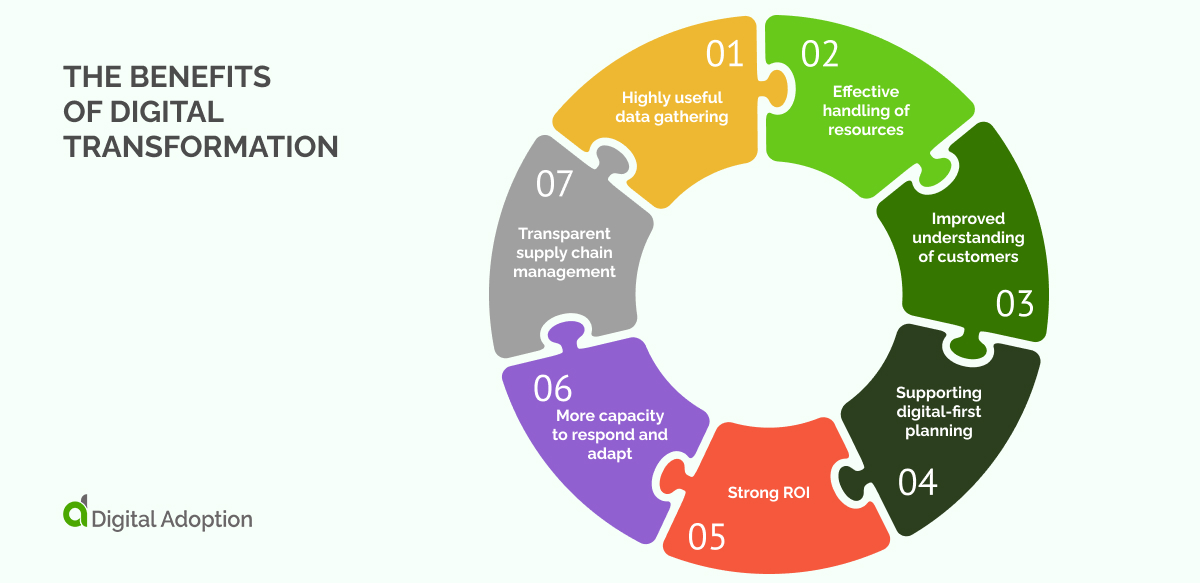
Digital technology has wide-ranging positive impacts on business.
It could be the difference between survival and failure – as the famous comparison of Blockbuster and Netflix reminds us!
Some of the top benefits of digital transformation include:
- Highly useful data gathering
- Effective handling of resources
- Improved understanding of customers
- Supporting digital-first planning
- Strong ROI
- More capacity to respond and adapt
- Transparent supply chain management
Digital transformation helps companies remain competitive in today’s rapidly evolving business landscape. It enables organizations to streamline processes, improve customer experiences, and make data-driven decisions to help them achieve their strategic goals.
4 Key Areas Of Digital Transformation
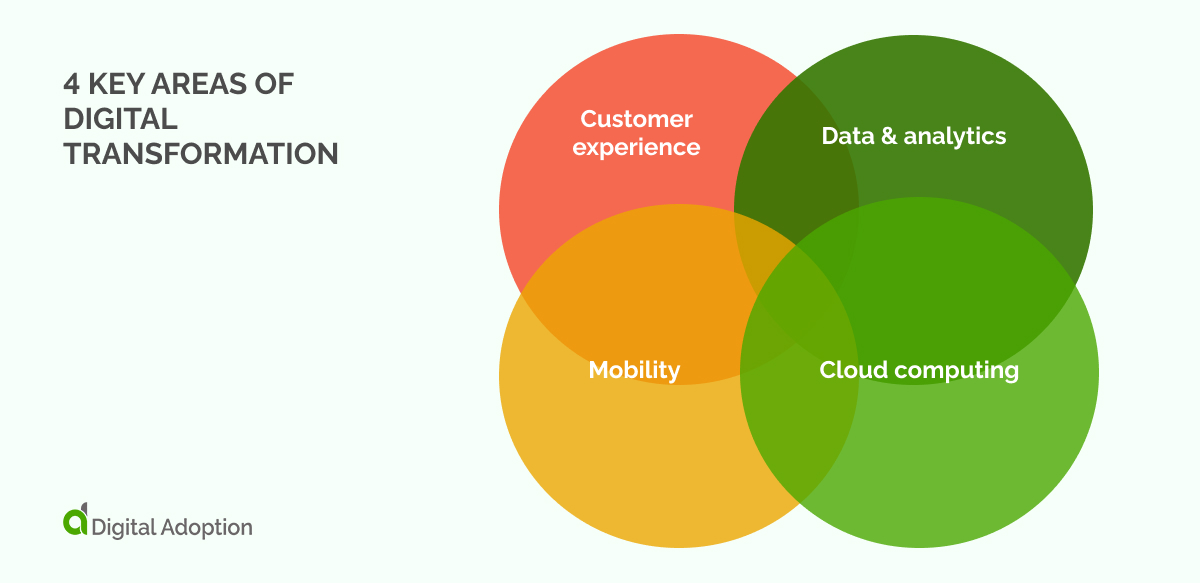
Digital transformation is a big topic. One way to divide it up is to follow the change agents who argue that digital transformation consists of four main areas:
- customer experience
- data & analytics
- cloud computing
- mobility.
Enabling enterprise digital transformation requires a holistic approach, targeting all areas simultaneously. Let’s see what happens in each area.
Improving the customer experience (CX) with digital technology
Digital transformation can improve customer experience by enabling organizations to deliver personalized interactions, seamless self-service options, and streamlined processes. By leveraging digital tools and platforms, businesses can understand customer preferences, provide tailored recommendations, and offer convenient channels for engagement.
Enhancing operations with data & analytics
Digital transformation can significantly improve data analytics for businesses in multiple ways.
First, it enables the collection and integration of data from various sources, including customer interactions, operations, and external sources. This consolidated data provides a comprehensive view, allowing businesses to gain valuable insights and make informed decisions.
Second, digital transformation facilitates using advanced analytics techniques, such as machine learning and predictive modeling, to extract meaningful patterns and trends from the data. This empowers businesses to anticipate customer needs, optimize processes, and identify new business opportunities.
Innovation through cloud computing
Cloud computing drives digital transformation by providing businesses with scalable and flexible infrastructure, enabling rapid deployment of digital services, facilitating seamless collaboration and remote work, and leveraging advanced technologies such as AI, IoT, and data analytics.
Empowering employees with mobility
Cloud computing drives digital transformation by providing businesses with scalable and flexible infrastructure, enabling rapid deployment of digital services, facilitating seamless collaboration and remote work, and leveraging advanced technologies such as AI, IoT, and data analytics.
How to build your roadmap to digital transformation
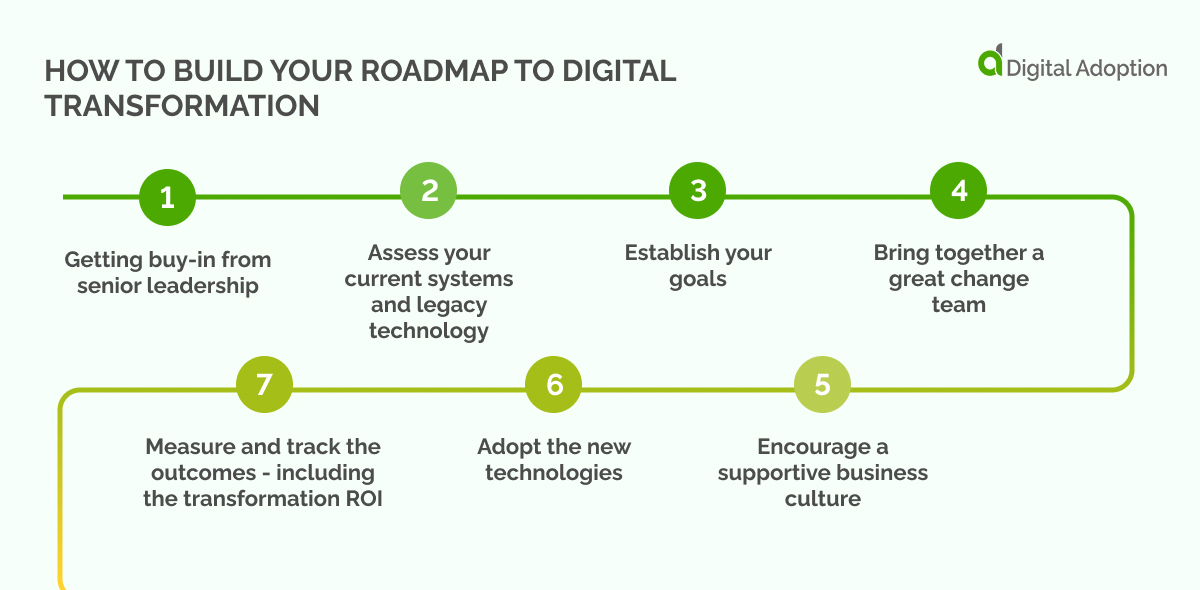
Digital technology can often be implemented with low risks. However, in a full digital transformation, there are plenty of risks.
The best solution is simple: plan, plan, and plan.
Without a comprehensive plan, you risk your transformation falling apart at the first hurdle. Create a suitable digital transformation roadmap from the beginning, and you’ll be ready for almost any eventuality.
At the planning stage, you might think about how cost, risk, and application will change your digital transformation efforts. Then, some of the steps you’ll go through include:
- Getting buy-in from senior leadership
- Assess your current systems and legacy technology
- Establish your goals
- Bring together a great change team
- Encourage a supportive business culture
- Adopt the new technologies
- Measure and track the outcomes – including the transformation ROI
As you can see, implementing technology is actually only a small part of the process. At the start of the project, they may seem like a surprise. But as you go on, you can only achieve good results through the people in your company.
What Is A Digital Transformation Framework?
A digital transformation framework is a set of guidelines for achieving meaningful organizational change. Frameworks are blueprints that digital transformation leaders use to help companies thrive in the digital era.
A digital transformation framework provides a proven method for leveraging new technologies to provide better customer service. Frameworks are beneficial for organizations that are unfamiliar with digital transformations.
They include key performance indicators, standards, and checklists that digital businesses use to secure their place in the digital economy.
The key roles in Digital Transformation Strategy
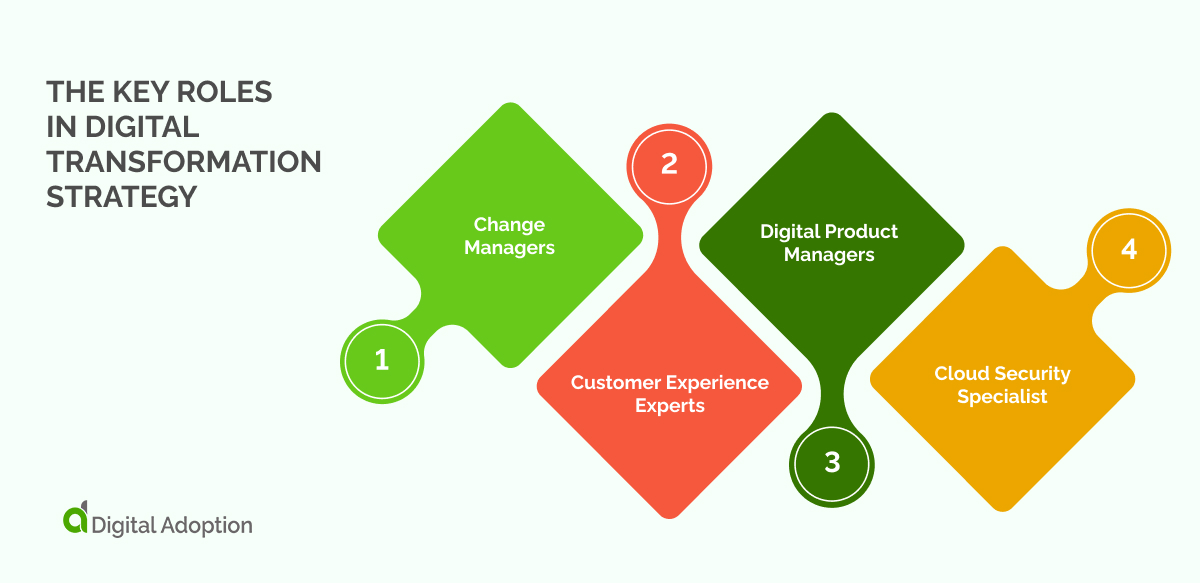
Creating the right team of talent will determine the success of your digital transformation project.
The planning and implementation team will inevitably include key IT leaders such as the CIO, CDO, CTO, etc. Leadership is especially important. A McKinsey article explains, “Strong senior leadership will catalyze growth” in digital transformation projects.
Other roles to consider include change managers, customer experience experts, digital product managers, and cloud security specialists. Let’s take a look at them.
Change Managers
Digital transformation significantly impacts the status quo and often leads to employee resistance. To address the problem, your company needs the expertise of a change manager. Change managers are experienced in leading transformations and affecting positive growth. They take a targeted approach to affecting change, enabling personalized training and support.
Customer Experience Experts
Every digital transformation project should lead to an improved customer experience transformation. Their role is to optimize, measure, and drive effective customer experience strategies. They work with data analysts to retrieve essential customer insights. They focus on emerging market trends, customer expectations, and ways to impact revenue growth.
Digital Product Managers
A digital product manager is responsible for leading the production of digital products to market success. These products include apps, software tools, and other digital solutions. The role of a digital product manager involves delivering products through digital channels to improve the user experience.
Cloud Security Specialist
Securing a cloud-based solution is much more complex than handling your current data servers and requires the input of a cloud security specialist. Your organization remains vulnerable to breaches and attacks without the right cloud security talent.
The Digital Technologies Driving Digital Transformation
New digital technologies are at the core of digital transformation. Of course, IT has been driving change in the business world for decades. But new digital tools open possibilities like never before.
Some of the key technologies currently driving digital transformation:
- Artificial Intelligence (AI) and Machine Learning (ML)
- Internet of Things (IoT)
- Cloud Computing
- Big Data Analytics
- Robotic Process Automation (RPA)
- Blockchain
- Augmented Reality (AR) and Virtual Reality (VR)
- 5G and Next-generation Networks
- Cybersecurity and Data Privacy Technologies
- Edge Computing
- Quantum Computing
- Automation and Robotics Technologies
Investing in smart technology is a complex process that requires a targeted approach. Business leaders must know how each technology impacts specific business areas to achieve desired results.
How to measure Digital transformation ROI
The people who plan digital transformation strategies for a living will tell you that measuring the impact is an important part of all digital transformation projects.
Making sense of your digital transformation KPIs is itself, a major task. Different projects require different emphases. But the digital transformation ROI is a metric that will decide the success or failure of a project.
Digital adoption platforms (or DAPS) are one of the best ways to measure the impact of a transformation initiative. DAPs can provide valuable insights into the impact of digital transformation on your organization and help you estimate the ROI of your investment in digital tools and technologies.
By tracking key metrics and using data to inform decision-making, you can ensure that your digital transformation initiatives deliver value and drive business growth.
How the COVID-19 Pandemic Impacted Digital Transformation
After the Covid-19 pandemic, many organizations began embracing digital transformation. Global trends indicate that customers expect companies to offer digital services as more people become tech-savvy.
During the pandemic, there was a massive increase in online shopping. Business leaders invested heavily in automation platforms to improve their online customer experiences. These digital platforms created a seamless interaction, allowing customers to receive support from online chatbots, view all their account information online, and order products remotely at the click of a button.
Even after the return to in-store shopping, customers still flock to online services for convenience. This is just one of many examples of digital transformation creating lasting change across industries.
Other trends within the workplace indicate a shift in employee attitudes toward work. The pandemic caused a surge in mental health issues related to work-life balance. Companies have taken different approaches to integrating workers back into the office.
Gartner’s research on the future of work research showed that “75% of hybrid or remote knowledge workers [agree] their expectations for working flexibly have increased.”
![Gartner’s research on the future of work research showed that “75% of hybrid or remote knowledge workers [agree] their expectations for working flexibly have increased.](https://www.digital-adoption.com/wp-content/uploads/2024/04/Gartners-research-on-the-future-of-work-research-showed-that-1024x456.jpg)
Many employees feel betrayed because they don’t want to return to the office. Employers make the wrong decision by forcing staff back to the office when they aren’t ready. Looking past the pandemic, it’s clear that employers will need to prioritize a strong support network for their workers.
What Does Digital Transformation Look Like In 2024?
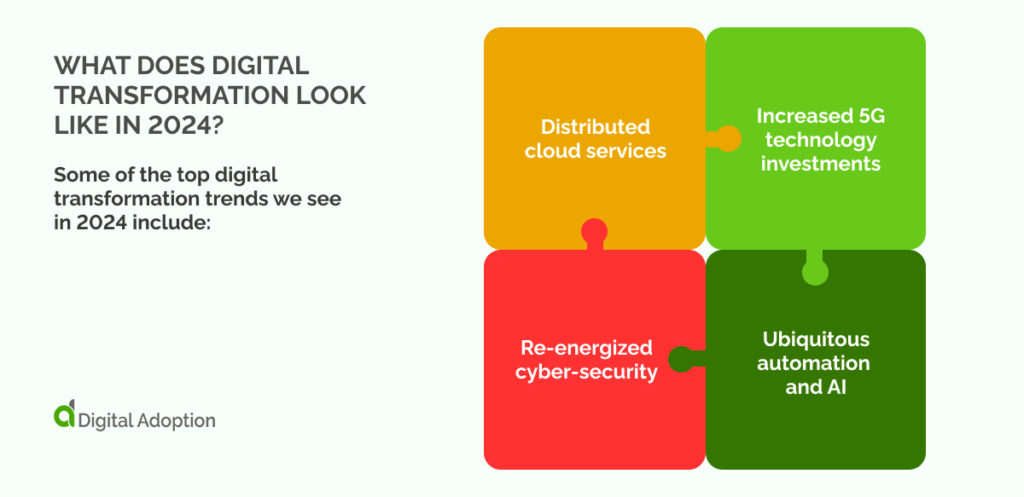
In 2024, Digital transformation continues to be a high priority for ambitious companies.
The pandemic forced digital transformation leaders to increase their efforts. Technologies such as artificial intelligence, cloud computing, machine learning, and other digital tools are at the forefront of global digital transformation initiatives.
Gartner report explains, companies seek to optimize resilience, scale their productivity, enhance customer engagement, and use digital solutions for questions in sustainability.
Some of the top digital transformation trends include:
- Distributed cloud services
- Increased 5G technology investments
- Ubiquitous automation and AI
- Re-energized cyber-security.
Of course – there are some more specific trends in different industries. The top trends in digital transformation in retail are naturally very different from those in insurance. Dig a bit deeper into your own industry to see what’s happening!
The time is now to start your digital transformation journey
There is still a lot of untapped potential in digital transformation. With the right technology investments, companies can build customer relationships, minimize supply chain disruptions, and sustain (or improve) business outcomes.
With stakes as big as this, the vision of DX leaders must likewise be expansive. McKinsey leaders suggested that digital transformations should aim to improve business outcomes by 15-20%.
A change on this scale will inevitably involve disruption and friction – but with the right starting point for your digital transformation journey, any company has a good chance of success. The major challenges, such as innovative ideas, employee resistance, and unpredictable markets, can be met with appropriate planning.
Just to recap our main ideas:
- “Digital transformation” is the complete transformation of business processes using digital technology. It may lead to a different operating model.
- Digital transformation brings many benefits. Together, they should add up to major improvements in business performance.
- Digital adoption platforms are a great tool to track the improvement of your digital transformation initiative over legacy systems.
- The trends in digital transformation are constantly changing – you need to keep informed!
Hopefully, you’re better prepared to meet the challenges of a company-wide digital transformation strategy.









